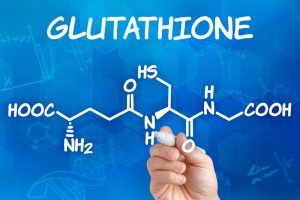 Glutathione is a substance that is naturally found in the body, and acts as one of our key antioxidants. An antioxidant is a substance that scavenges free radicals (molecules that are responsible for accelerated cellular damage and aging) keeping us young, healthy and functioning at high levels. Other antioxidants are the vitamins A, C and E and the minerals zinc and selenium.
Glutathione is a substance that is naturally found in the body, and acts as one of our key antioxidants. An antioxidant is a substance that scavenges free radicals (molecules that are responsible for accelerated cellular damage and aging) keeping us young, healthy and functioning at high levels. Other antioxidants are the vitamins A, C and E and the minerals zinc and selenium.
As an antioxidant, glutathione helps protect cells from damage. It does this by countering those free radicals, but even more than that, it helps to recycle other antioxidants such as vitamin C. So it not only is a powerful antioxidant itself but also makes other antioxidants work better.
This protective mechanism is very important in organs of detoxification such as the liver and kidneys. In fact, these organs are where the highest concentrations of glutathione are found. Glutathione helps the body to detoxify by binding toxins such as chemical residues and heavy metals and facilitating their excretion from the body. Given the amounts of toxins we naturally take in through air, water and food, plus the added insults of medications, toxic metals and so forth, you can see that this powerful molecule is very important to the body. The lungs and intestinal lining are also rich in glutathione, as they too are tissues that are in direct contact with toxins.
Glutathione also helps to support immune function. It plays a role in the proper function of white blood cells, including T-cells and other lymphocytes. Again, this is vital for anyone who is struggling with chronic illness and immune compromise.
In the past, one of the drawbacks with taking glutathione has been that it is rapidly broken down in the digestive system to an unusable form. So standard glutathione supplements were not effective. Some got around this by supplementing with N-acetyl cysteine, which is a precursor to glutathione.
However, now we have a far superior way to take glutathione – in a liposomal form. That means that the molecules are designed to combine with body fluids and absorb through the mucous membranes of the body (mouth and digestive tract), instead of relying on absorption through the gut (which is no good). It is a liquid, which can be mixed with a little water or juice. I take glutathione every morning mixed in with my Nanogreens, and it makes for a delicious healthy drink to start the day. Glutathione does best when taken on an empty stomach, but a small amount of another liquid combined with it is okay.
People feel clearer headed, more energetic and report a less toxic feeling when taking glutathione regularly. Adult dose is 1 teaspoon a day, but people who are very sensitive may start with lower doses and build up as they may experience a slight detox reaction.
The glutathione I have been using with my patients is Tri-Fortify Glutathione by Researched Nutritionals. I have been very happy with this formulation, and because it has a reduced pH, it has less of the sulfur-y taste that is typical of glutathione compounds.
Being that many chronically ill patients are known to have depleted glutathione levels, this may be a worthwhile supplement to consider adding to your regimen.
For more information on Tri-Fortify Glutathione, or to purchase, click here.
